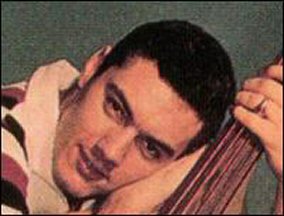 Amos Records was founded in mid-1968 in Los Angeles by Jimmy Bowen. Bowen was a
veteran of the music business, having had both hits himself and hits as a producer in the studio for
others. The label was located at 6565 Sunset Boulevard in Los Angeles, with a branch office in New
York City. (This Jimmy Bowen is not the same as the North Carolinian of the same name who fronts the
bluegrass band Santa Fe.)
Amos Records was founded in mid-1968 in Los Angeles by Jimmy Bowen. Bowen was a
veteran of the music business, having had both hits himself and hits as a producer in the studio for
others. The label was located at 6565 Sunset Boulevard in Los Angeles, with a branch office in New
York City. (This Jimmy Bowen is not the same as the North Carolinian of the same name who fronts the
bluegrass band Santa Fe.)
Jimmy Bowen grew up in the Texas Panhandle town of Dumas, a town of a few thousand people in the middle of nowhere. He and a friend, Buddy Knox, started singing together as students at West Texas State College (now West Texas A&M University). WTSC was in Canyon, Texas, not far from Amarillo, the largest city in the Texas Panhandle. They formed a band they called the Orchids (after the color of their shirts), which featured Knox on guitar/lead vocals and Bowen on bass/vocals, along with guitarist Don Lanier. They played around town and in Dumas and became popular. When Roy Orbison and the Teen Kings played at WTSC, Orbison met the Orchids and told them about a little recording studio run by Norman Petty in Clovis, New Mexico, about 80 miles from Canyon. The Orchids decided to go do some recording, and recorded a couple of sides there in three all-night sessions in 1956 (the all-night recording being necessary because trucks on the road outside the studio during the day would be audible on the recordings).
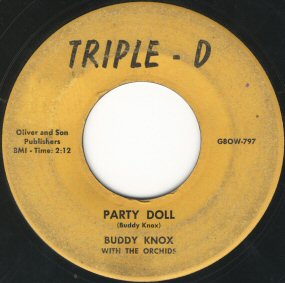
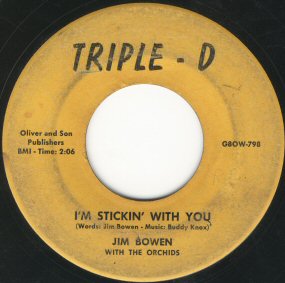 The Orchids didn't have a drummer, so they used one who was at the studio, Dave Alldred, who later
joined the band. Alldred didn't even have a drum kit for the sessions, just a couple of drum sticks and a
box stuffed with tissue. A local high school girl played cymbals. Buddy Knox's sister and two of her
friends added background vocals.
The Orchids didn't have a drummer, so they used one who was at the studio, Dave Alldred, who later
joined the band. Alldred didn't even have a drum kit for the sessions, just a couple of drum sticks and a
box stuffed with tissue. A local high school girl played cymbals. Buddy Knox's sister and two of her
friends added background vocals.
Chester Oliver, who owned Blue Moon Records, heard that they had some masters and asked if he could press up some copies for them (Oliver also had a publishing company). The boys paid and this was done, with the label being called Triple-D, after the Dumas radio station, KDDD, where Jimmy Bowen had worked at one time and where the group performed regularly. One side, "Party Doll," was billed as "Buddy Knox with the Orchids," while the other side, "I'm Stickin' with You," was credited to "Jim Bowen with the Orchids." The disc had no record number — either on the label or in the dead wax — other than the master number (G8OW-797 and G8OW-798), which was obviously different for each side. For some reason, the record is usually referenced by the last three digits of the master number of the B-side (i.e., "I'm Stickin' with You") — "Triple-D 798." The Orchids' record was played on the radio, but it sold only a few hundred copies in the Panhandle and nearby cities such as Lubbock. Today the Triple-D record, the first for Rockabilly Hall-of-Famer Buddy Knox and legendary producer Jimmy Bowen, is so rare that it is listed in catalogues for a thousand dollars in mint condition.
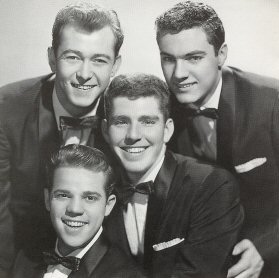 Their break came when Don Lanier's sister, who was a model in New York, heard that New York record
mogul Morris Levy was looking for new talent. She dropped off a copy of the record with Phil Kahl,
Levy's partner, and Levy and Kahl liked what they heard. Levy signed them to his new Roulette label,
and split their single into two different releases. Kahl became Knox's manager. "Party Doll" was
reissued with a new flip as Roulette 4002, where it soared to #1 nationally after its release in early 1957.
Likewise, Jimmy Bowen's side was issued, with a new flip, as Roulette 4001, where it managed to make
the national top-15. An album followed for each. Even though the album liner notes claimed that the
Triple-D songs had been re-recorded for Roulette, this was not true. The versions on the Triple-D single
are exactly the same as the later Roulette releases. Buddy Knox later recalled that once they gave the
masters to Chester Oliver, they never saw them again. Obviously, Levy retrieved them from Oliver when
the group signed with Roulette.
Their break came when Don Lanier's sister, who was a model in New York, heard that New York record
mogul Morris Levy was looking for new talent. She dropped off a copy of the record with Phil Kahl,
Levy's partner, and Levy and Kahl liked what they heard. Levy signed them to his new Roulette label,
and split their single into two different releases. Kahl became Knox's manager. "Party Doll" was
reissued with a new flip as Roulette 4002, where it soared to #1 nationally after its release in early 1957.
Likewise, Jimmy Bowen's side was issued, with a new flip, as Roulette 4001, where it managed to make
the national top-15. An album followed for each. Even though the album liner notes claimed that the
Triple-D songs had been re-recorded for Roulette, this was not true. The versions on the Triple-D single
are exactly the same as the later Roulette releases. Buddy Knox later recalled that once they gave the
masters to Chester Oliver, they never saw them again. Obviously, Levy retrieved them from Oliver when
the group signed with Roulette.
For some time, both Knox and Bowen had records on Roulette released under their names, backed by the now-renamed Rhythm Orchids, but essentially, it was all the same group. Knox continued to have pop hits until 1961, after which he edged into country music, where he charted in 1968 with "Gypsy Man" [United Artists 50301]. Dave Alldred later became the drummer for the group Dicky Doo and the Don'ts, who had several chart singles. Don Lanier also recorded later, as a solo artist, but did not have the success the others had.
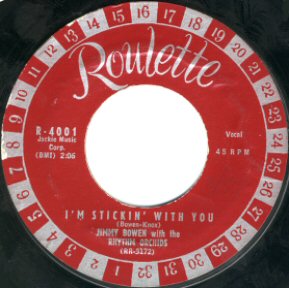 The Roulette reissue of "I'm Stickin' with You" was a two-sided hit, with the flip, "Everlovin' Fingers"
reaching #63. Bowen placed two other singles for Roulette on the top-60, but that was it for chart
records, although he put out many more singles over the next 10 years or so. With his radio background,
however, Bowen showed a real knack for the studio, and began producing records for others. He went
to Los Angeles and eventually was good enough (at age 25) to be hired by Frank Sinatra for his Reprise
Records, where Bowen produced hit records for Dean Martin, Frank Sinatra, and Sammy Davis, Jr.,
among others. He was married in 1965 to singer Keely Smith; the couple later divorced.
The Roulette reissue of "I'm Stickin' with You" was a two-sided hit, with the flip, "Everlovin' Fingers"
reaching #63. Bowen placed two other singles for Roulette on the top-60, but that was it for chart
records, although he put out many more singles over the next 10 years or so. With his radio background,
however, Bowen showed a real knack for the studio, and began producing records for others. He went
to Los Angeles and eventually was good enough (at age 25) to be hired by Frank Sinatra for his Reprise
Records, where Bowen produced hit records for Dean Martin, Frank Sinatra, and Sammy Davis, Jr.,
among others. He was married in 1965 to singer Keely Smith; the couple later divorced.
In 1968, after six years and dozens of production hits with Reprise, Bowen decided to set up shop for himself as Amos Productions, Inc., with a record division called Amos Records. During the years Amos Records was issuing product, from 1969 to 1971, Jimmy Bowen himself did most of the studio production.
Bowen went into country and western music production in the early 1970s as Amos was winding down, eventually moving to Nashville. He worked for MGM, Elektra, and took over MCA-Nashville in 1977. Later he headed up Capitol-Nashville during Garth Brooks' heyday. A cancer scare gave him pause (his friend Buddy Knox died of cancer on Valentine's Day, 1999), and he retired to Hawaii as a country music legend.
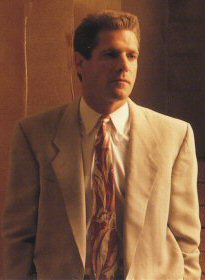 Interestingly, the Amos label is noted today not only as a stage in Bowen's career between Los Angeles
and Nashville, but for a key event in the history of one of America's best-known popular music bands,
the Eagles. It was at Amos Records that the two primary members of that group met:
drummer/guitarist/vocalist Don Henley and guitarist/keyboardist/vocalist Glenn Frey. Frey was signed to
Amos as part of the group Longbranch/Pennywhistle, and Henley was in Shiloh, another group signed to
Amos. As do most musicians signed to small labels, neither of the two felt their albums were getting "the
promotion they deserved," and spent time with other Amos musicians down at the Troubadour night club
commiserating about how their careers were going down the drain. It was during this time that unknowns
such as Henley, Frey, John David Souther, Jackson Browne, and others hung out and wrote songs, and
it was shortly thereafter that Henley and Frey formed the Eagles, adding guitarist Bernie Leadon and
bassist Randy Meisner to fill out the original quartet. Some of their hit songs were collaborations with
friends from that time such as Jackson Browne and John David Souther.
Interestingly, the Amos label is noted today not only as a stage in Bowen's career between Los Angeles
and Nashville, but for a key event in the history of one of America's best-known popular music bands,
the Eagles. It was at Amos Records that the two primary members of that group met:
drummer/guitarist/vocalist Don Henley and guitarist/keyboardist/vocalist Glenn Frey. Frey was signed to
Amos as part of the group Longbranch/Pennywhistle, and Henley was in Shiloh, another group signed to
Amos. As do most musicians signed to small labels, neither of the two felt their albums were getting "the
promotion they deserved," and spent time with other Amos musicians down at the Troubadour night club
commiserating about how their careers were going down the drain. It was during this time that unknowns
such as Henley, Frey, John David Souther, Jackson Browne, and others hung out and wrote songs, and
it was shortly thereafter that Henley and Frey formed the Eagles, adding guitarist Bernie Leadon and
bassist Randy Meisner to fill out the original quartet. Some of their hit songs were collaborations with
friends from that time such as Jackson Browne and John David Souther.
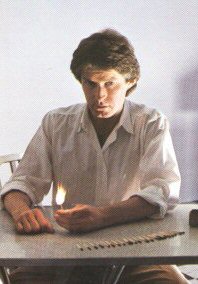 Don Henley was originally from Linden, Texas, and attended North Texas State University (now
University of North Texas) during the 1967 and 1968 school years. He had been in a band called the
Four Speeds in high school, and after his sophomore year at NTSU, decided to reconnect with the band,
who had changed their name to Shiloh. While still in Texas, the band recorded a single ("Jennifer"/"Tell
Her to Get Out of Your Life") and got it released on Amos Records [Amos 140]. Although it flopped, the
band members (now including future Nashville record executive Jim Ed Norman, who produced many
hits for Anne Murray) decided to move to California, and by the early summer, 1969, they were in Los
Angeles, where they recorded the album for Amos (the first single was not included on the album, oddly
enough). The album and a new single taken from it didn't do much better than the first single.
Don Henley was originally from Linden, Texas, and attended North Texas State University (now
University of North Texas) during the 1967 and 1968 school years. He had been in a band called the
Four Speeds in high school, and after his sophomore year at NTSU, decided to reconnect with the band,
who had changed their name to Shiloh. While still in Texas, the band recorded a single ("Jennifer"/"Tell
Her to Get Out of Your Life") and got it released on Amos Records [Amos 140]. Although it flopped, the
band members (now including future Nashville record executive Jim Ed Norman, who produced many
hits for Anne Murray) decided to move to California, and by the early summer, 1969, they were in Los
Angeles, where they recorded the album for Amos (the first single was not included on the album, oddly
enough). The album and a new single taken from it didn't do much better than the first single.
Glenn Frey had grown up in the Detroit area, where his parents provided him piano lessons as a boy. When he heard the Beatles in 1964, he took up the guitar in earnest (as Elton John once observed, it's hard to be a rock idol chained to a piano). He recorded some singles and played backup guitar on Bob Seger's "Ramblin' Gamblin' Man," but decided that his future lay in California, especially since his girlfriend was moving there. He moved to Los Angeles in 1968, where he met a fellow Detroit expatriot, John David Souther, who was dating his girlfriend's sister. Souther taught Frey how to play country music, and the two formed a band called Longbranch/Pennywhistle. They signed with Amos Records. Like Henley, Frey became disillusioned with Amos, and both Henley and Frey soon became backup musicians for Linda Ronstadt, where Leadon and Meisner eventually joined them before the four split off to become the Eagles.
Other than Shiloh and Longbranch/Pennywhistle, who are interesting in retrospect but were unknown at the time, Amos had several artists who were very well known. The roster included Bing Crosby, Frankie Laine, Johnny Tillotson, and Mel Carter. The last album released on Amos' pop music series was the first album by future star Kim Carnes. On the singles side, Amos also issued records by Frankie Avalon, the Hondells, and Mike Settle (formerly of the New Christy Minstrels and First Edition). Other singles artists signed to the label included Jerry Fisher & Timepiece, the Great Awakening, Steve Colt & Paradox, Ebony Jam, Erik, Dove, Casey Anderson, Headstrong, Lola Falana, the Standards, George McCannon, Little Helen, Don & Debbi, the Buffalo Hunters, Manuela, John Bahler, Pat Shannon, Sam Nesbit, Jane Crutchfield, Kim & Dave, J.B. Pickers, Billy Olive, Running Bear, Kim Vassy, and Dave Ellingson.
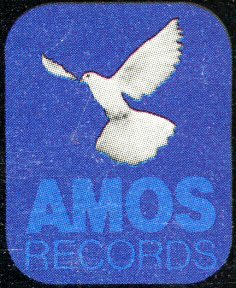 Amos Album Discography
Amos Album Discography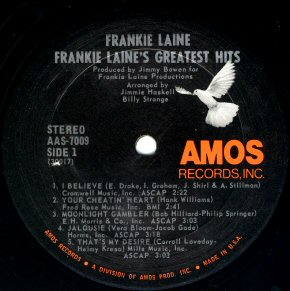
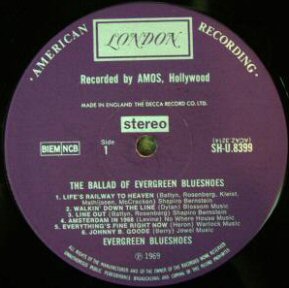
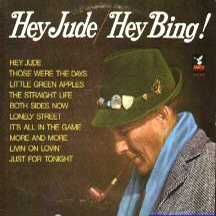
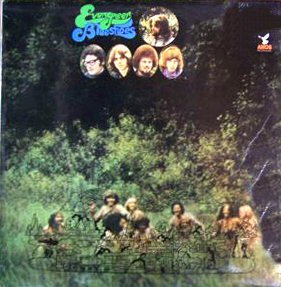
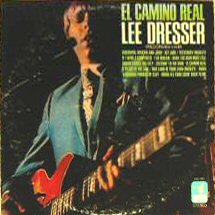
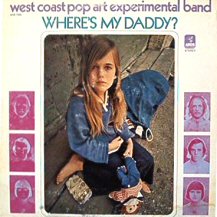
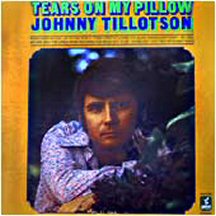
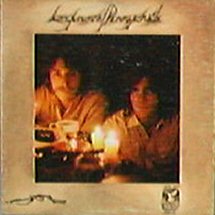
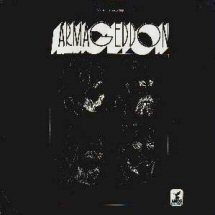
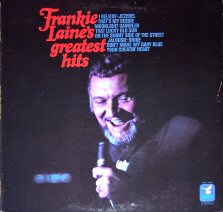
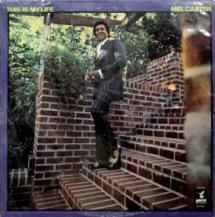
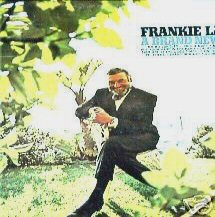
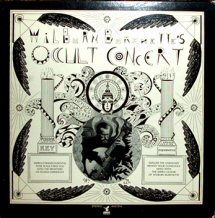
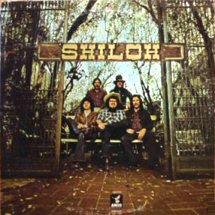
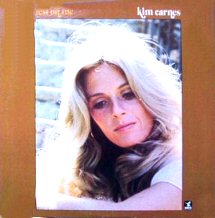
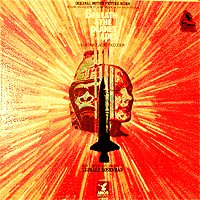
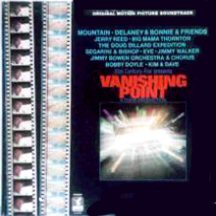
 Back to the Discography Listings Page
Back to the Discography Listings Page